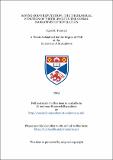Files in this item
Saving God's reputation : the theological function of 'pistis Iesou' in the cosmic narratives of Revelation
Item metadata
| dc.contributor.advisor | Longenecker, Bruce W. | |
| dc.contributor.author | Tonstad, Sigve K. | |
| dc.coverage.spatial | ii, 383 p. | en_US |
| dc.date.accessioned | 2018-05-23T12:08:10Z | |
| dc.date.available | 2018-05-23T12:08:10Z | |
| dc.date.issued | 2005 | |
| dc.identifier.uri | https://hdl.handle.net/10023/13491 | |
| dc.description.abstract | Scholars generally see the aspiration of the Roman Empire and the imperial cult in Asia Minor as God's chief antagonists in Revelation, treating the depiction of a cosmic conflict in the book mostly as metaphors that hold little or no explanatory power in the story. In this thesis I pursue the complementary and partly contrary conviction that the cosmic conflict imagery is the primary and controlling element in the account. Such a reading puts the war-in-heaven theme in the foreground, calling on interpreters to pay far more attention to the illustrious heavenly being whose attempt to subvert the truth about the divine government is the unremitting concern in Revelation. My first aim is therefore to redress the distortion that results from leaving the larger conflict theme underexposed. Having first developed the story line, I next aim to show that the phrase pistis Iesou in Revelation is best understood when Revelation is read as a theodicy of God's handling of the reality of evil, expressing on the one hand 'the faithfulness of Jesus' in the unmasking of evil, and on the other hand his faithful disclosure of God's character. In the form of a slaughtered Lamb Jesus brings God's maligned character to light, thereby saving God's embattled reputation, and against this wholly unexpected manifestation the slanderous and subversive design of the cosmic adversary is to no avail. Pistis lesou, understood as the legacy of 'the faithfulness of Jesus,' stands as the defining and preserving element when the forces of deception bring their final effort to bear on believers in Revelation. I conclude that pistis lesou understood as 'the faithfullness of Jesus' reflects the concern of Revelation better than the three interpretations currently in use, "the faith of Jesus," "faith in Jesus," or "faithfulness to Jesus." | en_US |
| dc.language.iso | en | en_US |
| dc.publisher | University of St Andrews | |
| dc.subject.lcc | BS2825.52T7 | |
| dc.subject.lcsh | Bible.--N.T.--Revelation--Criticism, interpretation, etc. | en |
| dc.subject.lcsh | Bible.--N.T.--Revelation, XIV, 12--Criticism, Textual | en |
| dc.title | Saving God's reputation : the theological function of 'pistis Iesou' in the cosmic narratives of Revelation | en_US |
| dc.type | Thesis | en_US |
| dc.type.qualificationlevel | Doctoral | en_US |
| dc.type.qualificationname | PhD Doctor of Philosophy | en_US |
| dc.publisher.institution | The University of St Andrews | en_US |
This item appears in the following Collection(s)
Items in the St Andrews Research Repository are protected by copyright, with all rights reserved, unless otherwise indicated.

